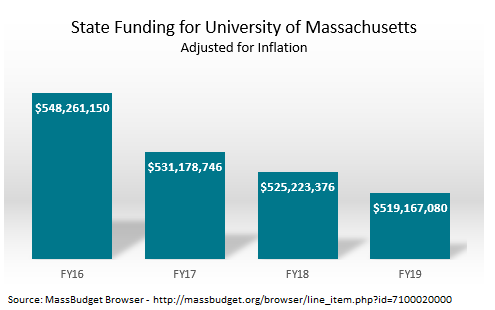What do we want? … #ZeroDebt! …..When do we want it? … Now!
By Bahar Akman Imboden
Tuition and fees at the University of Massachusetts campuses will increase by 2.5 percent in the 2018–2019 academic year. This is the 5th consecutive year of increases, culminating in an almost 20 percent hike! This is unacceptable and exposes Massachusetts’ lack of commitment to accessible public higher education.

This year, Massachusetts’ budget has an excess of $1 billion in revenue. Despite being in a year of budgetary surplus, our state has failed to give public colleges much needed financial support. Research shows that decline in state aid is an important factor pushing tuition and fees up. State funding for the UMass system has declined in the last four years, resulting in a $30 million decrease in support compared to 2016.
Massachusetts takes pride in its prestigious private colleges and universities, but we continuously neglect our public institutions. As a state, Massachusetts ranks 36th in higher education spending per capita in the country — 16 percent below the U.S. average. State funding per student for higher education has decreased by 32 percent since 2001, while state scholarship funding per student has been cut by an additional 32 percent.
Now is the time to take action. We cannot sit back and watch public higher education become inaccessible our our youth. The Hildreth Institute has joined forces with students and faculty to protest consecutives years of tuition hikes, state disinvestment from higher education, and the resulting increase in student debt burden.
A mother of two UMass students (Dartmouth ’18 and Amherst ‘19), recently shared her story on the challenges these tuition increases created for her family. “It was always coming as a surprise and not giving us enough time to plan financially. As my children had reached their max federal loan eligibility, I had to borrow Parent Plus loans to cover the increases.” Parent Plus loans have higher interest rates and are not eligible for income-based repayment or forgiveness programs.
Our public colleges no longer offer an affordable route to obtaining a degree. The share of college expenses assumed by students and families has doubled in the last 15 years. Student debt per capita has increased by 122 percent from 2004 to 2016, after adjusting for inflation. In fact, the average debt of a Massachusetts public school graduate has risen to $30,248; only 7 percentless than the debt accrued by those in the private sector.
Students, families, and voters see major problems with the current system of financing higher education with loans. Two-thirds (66 percent) think the current system is not working and agree that tuition increases by colleges and universities are greatly responsible for the student debt problem. 78 percent of voters believe the type of higher education needed to succeed in today’s world is not accessible to all Massachusetts students.
Our current financial aid system that is too dependent on loans, and the public is ready enact meaningful change. Through loans, the cost of college has passed onto students and their families, resulting in enduring financial and emotional burdens on young people and families across Massachusetts.
In the current political climate, there is rare bipartisan consensus in Massachusetts to replace loans with grants to increase higher education accessibility. 82% of voters support creating a zero-debt public college system where students can get a degree without debt.The time is ripe for reforming the way we finance our higher education system. We must act now.

